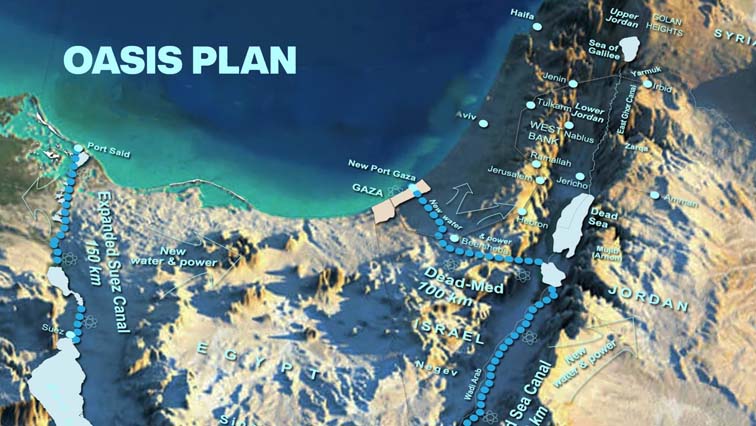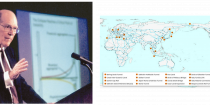This article appears in the February 23, 2024 issue of Executive Intelligence Review.
by Kevin Gribbroek
We have reached a point in history, where because we are sitting in one boat, we must step up to the level of reason, of finding a solution for the entire human species.
Helga Zepp-LaRouche
Feb. 16—The 37th meeting of the International Peace Coalition (IPC), convened Feb. 16, 2023, was devoted to fighting the pragmatism which infects the minds of most people in today’s society, which prevents them from conceptualizing higher-level solutions to the grave crises threatening mankind. People are often blinded by the particulars of the various conflicts—Gaza or Ukraine—robbing them of the ability to envision a means of resolving them, which would require simultaneously taking into account the needs of every single nation on the planet. This was the challenge taken up with the showing to the IPC of the new video: “The Oasis Plan—LaRouche’s Solution for the Middle East,” produced by The LaRouche Organization.

Helga Zepp-LaRouche, founder of the Schiller Institute and initiator of the IPC, opened the proceedings with a strategic overview, pointing out that in Germany the annual meeting of the Munich Security Conference was taking place. This conference, in the past a forum for finding solutions to critical security issues, has now degenerated into a public relations event for the military-industrial complex—the tone of the event being that of confrontation, not diplomacy. One exception was António Guterres, Secretary General of the UN, who made clear that 1.4 million Palestinians are facing an unimaginable destiny in Rafah. Also, the President of Ghana spoke, demanding a just new economic order, saying it cannot continue that one part of the world lives in wealth and the other part is faced with starvation.
Zepp-LaRouche continued by reporting on the 52 countries that will testify before the World Court in The Hague for one full week, starting Feb.19, on the subject of a UN General Assembly resolution of Dec. 30, 2022, alleging human rights violations against Palestinians by the Israelis over a period of 55 years. This is good, she said, but something much more fundamental is needed: Unless the hopelessness of the situation is changed, a solution can’t be found. This is why Lyndon LaRouche’s 1975 Oasis Plan for economic development of the entire region is so crucial. Unless you kick over the table of geopolitics—which the Oasis Plan would do—and go into a new paradigm of development, there is no hope.
Zepp-LaRouche emphasized the importance of “flooding the zone”; getting the Oasis Plan video out far and wide. With that, the video was shown.
Jason Ross, Executive Director of The LaRouche Organization and producer of the video, then fielded questions from IPC participants. Ross opened by making the point that charting a path toward peace sometimes requires changing the terrain. Under the current paradigm of “hegemonism,” there is no possibility of peace. There are two aspects of this paradigm which must be changed: The UN has estimated that it will cost $20 billion to reconstruct Gaza, and that it would take until 2092. This monetarist conception doesn’t take into account the necessity of transforming not only Gaza but the entire region in a way that benefits all people.
The other aspect is the problem that there are people who oppose war, who also, at the same time, whether they know it or not oppose peace. Ross used energy policy as an example: The Oasis Plan calls for nuclear power as the most efficient means of generating energy. Regrettably, many of the people who oppose war also have a Green, anti-growth Malthusian ideology and are opposed to nuclear energy. This ideology will doom people to poverty and unnecessary death, preventing the establishment of a new paradigm of peace through economic development. Ross concluded his remarks by stressing that the Oasis Plan is not contrary to the necessity of a ceasefire.
A participant from the UK sparked a very useful discussion with a question on how to finance development outside the conditionalities that enslave countries to Western finance. Ross explained that there is a new paradigm of lending outside of the IMF/World Bank policy of debt slavery, focused on lending for real physical economic development. This type of lending is being carried out by the African Development Bank, the New Development Bank, and various Chinese banks that are financing the many Belt and Road Initiative projects worldwide.
Dennis Small of the Schiller Institute added that, operating under the current bankrupt trans-Atlantic financial system, U.S. and British banks will lend for real development only after Hell freezes over. With $2 quadrillion of financial aggregates on their books, Western banks lend for one purpose: more speculation. The aim of this type of lending is to ensure that no physical economic development occurs and to impose Malthusian genocide particularly on poor nations of the world. Those who attack China—an integral part of this new lending paradigm—need to explain how China succeeded in lifting 850 million of its people out of extreme poverty.
Bob Cushing of Pax Christi began by reading from the Book of Isaiah, Chapter 58, Verses 6–14, on the topic of fasting. Then, after adding a quote from peace activist and columnist Frida Berrigan, he concluded, “Here’s the ‘to do list’ now: Release the prisoners; set free the oppressed; share your food with the hungry; open the doors for the homeless; clothe the naked; end the wars. Now let’s get to work!”
Dennis Speed of the Schiller Institute emphasized that with the proceedings before the World Court starting Feb. 19 on behalf of the UN General Assembly (mentioned above), a “field of action” has been made available to us for escalating our intervention into the strategic situation.
Alejandro Zenteno Chávez of Mexico’s Reason and Thought Society offered greetings to the IPC and stated his belief that the Oasis Plan provides a path to a solution for the whole world.
In her concluding remarks, Helga Zepp-LaRouche took the IPC participants on a tour of the “long arc of history,” noting that there have been several “high periods of human civilization” from Confucianism in China through the Greek Classical period to the Italian Renaissance and the American Revolution. However, throughout this historical arc, the dynamic was such that one area of the world could be experiencing a renaissance while another was in a dark age. Today that is no longer the case. Humanity is sitting in one boat: nuclear weapons would destroy everyone; the internet allows global connectivity; because of air travel, pandemics affect the whole world. Zepp-LaRouche expressed her conviction that because of this dynamic, regional solutions to crises won’t work.
Although nations will continue to be important, a paradigm must emerge that does not allow the interest of any one nation to be put above the interest of humanity as a whole. Common economic development among nations makes this possible. A discourse is necessary to establish a vision for how to preserve our immortality as a species—not only here on Earth but throughout the galaxy—given the reality of the inevitable demise of our solar system over the next billion or so years. With the gigantic vacuum of leadership in the North Atlantic, our task is to bring the idea of the new paradigm into the public discourse. This includes “flooding the zone” with the Oasis Plan. A handful of leading people coming out in support of the new paradigm could spark a renaissance and spread it like wildfire.












